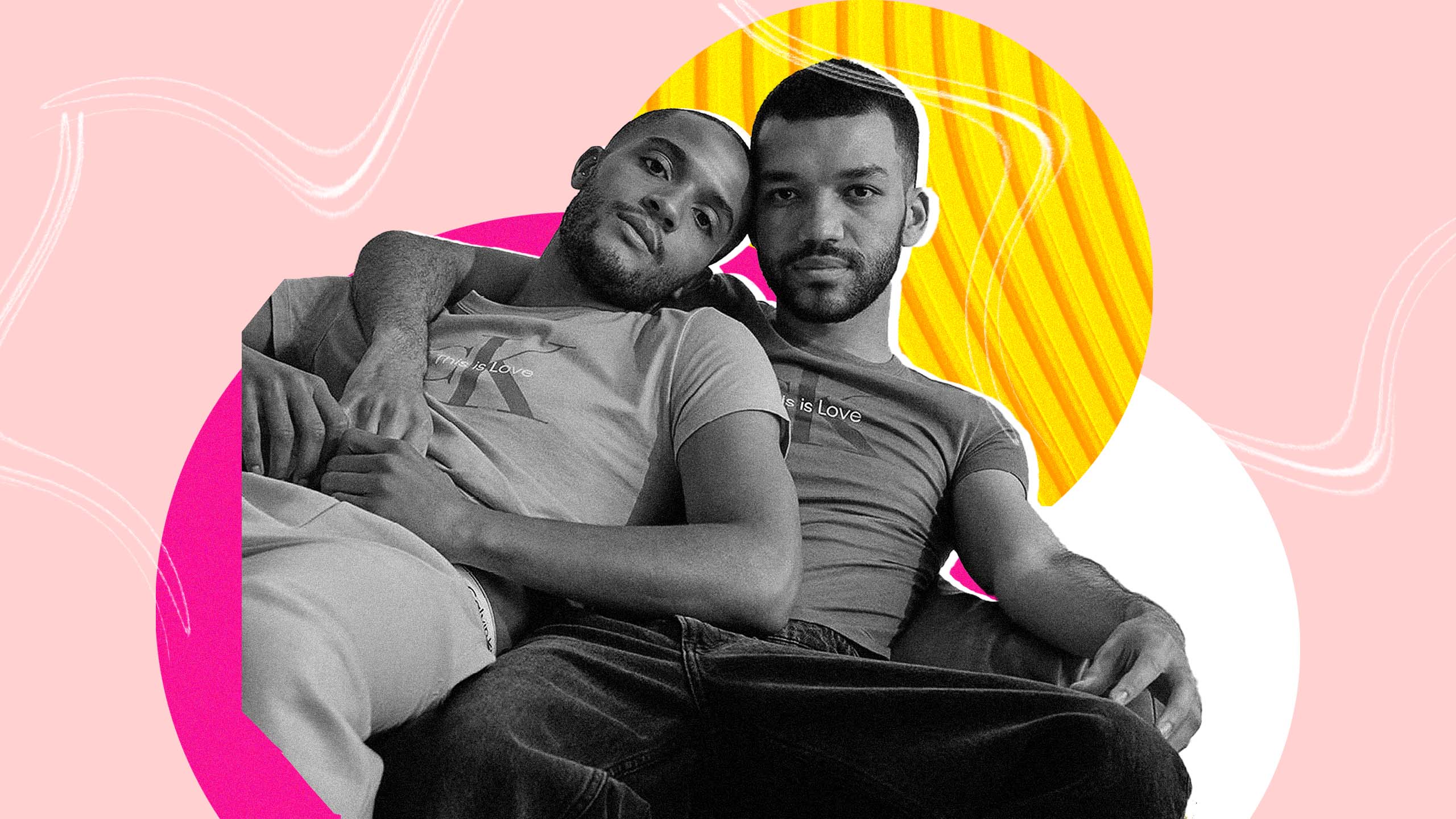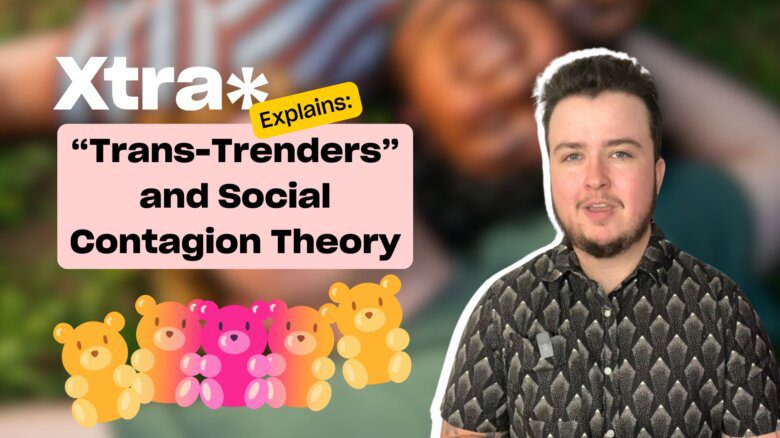My digital shrine to actors Justice Smith and Nicholas Ashe started eight months ago. A thread of almost every photo I can find of the couple, this virtual scrapbook captures what feels like a rarity of their level of celebrity: a Black queer man in a relationship with another Black queer man. Their love triggers something positive in me. Part of it, I’m sure, is the same sense of euphoria many feel when they see any happy couple. But with Justice and Nic, I also feel a sense of pride. Perhaps even hope.
I remember when my parasocial relationship with them began. It was June 2020, the first summer of the COVID-19 pandemic that we’d later call the “summer of racial reckoning.” Following yet another series of killings of Black folks by police, people nationwide took to the streets in historic numbers, demanding accountability and action. It was also Pride Month, and as the digital director of Out magazine at the time, I was having my own reckoning around how to use such a platform as a Black gay man. The day before my birthday—a Saturday—I saw an Instagram post from Justice, who starred in HBO Max’s Genera+ion, Netflix’s The Get Down and the 2019 film Pokémon: Detective Pikachu.
“Nicholas Ashe and I protested today in New Orleans,” his caption began. “We chanted ‘Black Trans Lives Matter’ ‘Black Queer Lives Matter’ ‘All Black Lives Matter.’ As a Black queer man myself, I was disappointed to see certain people say Black Lives Matter, but hold their tongue when Trans/Queer was added.”
“A Black queer man in a relationship with another Black queer man. Their love triggers something positive in me.”
The statement struck me. This was, to my knowledge, a coming out. (Later, Justice tweeted “yo tf I didn’t come out, y’all came in.”) Still lying in bed, I opened the Notes app on my phone and began to draft an article, glancing back and forth to the IG post. After detailing the importance of including in Black Lives Matter demonstrations the names of Black trans folks like Tony McDade, who’d been killed by police in Florida earlier that summer—much like the organizers of the Brooklyn Liberation March and the Stonewall Protests would demand later—the caption turned into a conversation about love.
“There is so much tragedy on the timeline these last couple of days, so I added some photos of me and Nic to show some Black boy joy, Black love, Black queer love,” he continued before writing to Nic, an actor in his own right, known for his role in Ava DuVernay’s Queen Sugar and in the Tony-nominated Broadway production Choir Boy, which was written by Moonlight’s Oscar-winning scribe Tarell Alvin McCraney. “You’ve been my rock and guiding light through all of this and I love you so much. I know that on the other side of this is change, though the fight is far from over.”
Not only was this post Justice’s coming out; it was also Nic’s. And they were announcing to the world that they were dating. I immediately switched to my laptop, wanting to publish the story with a new sense of urgency. But while hammering through words—and debriefing on speakerphone with a friend—I found myself oddly emotional.
I don’t remember the first couple that I saw that I wanted to model a relationship after. Undoubtedly, it was a heterosexual arrangement. Some white woman and white man. But I do remember one couple that had a tremendous impact on me early on: fashion designer Marc Jacobs and entrepreneur Lorenzo Martone.
I was obsessed with the fashion industry from a young age; my first research paper in the third grade was on 19th-century designer Charles Frederick Worth, considered by some to be the father of haute couture. I was fascinated not only with the clothes, but also the inner machinations of the industry and the people who made it up. Marc, then pulling double duty leading his own brand as well as that of Louis Vuitton, was indisputably one of those people.
It was the end of my junior year in high school, in 2008, when Marc and Lorenzo made their public debut. At the time, I was following Marc because I was enamoured with his creative work; his penchant for wearing kilts was a plus. But I quickly became engrossed in their relationship. I fawned over every image of them that surfaced. I devoured every interview either of them gave. No matter the tidbit, I knew it. I even remember the rumours that they had allegedly married and how I scoured the internet for a much-discussed article in Butt magazine in which Lorenzo confirmed it—there was a ceremony, but the pair did not sign legal documents—and shared intimate details of their relationship. And when the news surfaced that they had split in 2010, I remember being heartbroken. Because just like that, it was over.
“I was infatuated with a couple that was more than just a picture of love I imagined, but a hope for a love I’m not sure I ever did quite dream of for myself.”
I sent a tweet via text, as we did in those days. Something to the effect of, “If Marc Jacobs and Lorenzo Martone can’t make love work, who can?” A bit melodramatic, but I was a college sophomore who had worn all black for a week months prior to mourn the death of Lee Alexander McQueen. I took it all seriously because of how truly invested I felt at the time.
This is important context for understanding my thoughts on representation. I do not believe in the one-for-one model of visibility. As a Black gay man raised in the South, I don’t need to see a Black gay man raised in the South on TV or in culture to feel seen or know that there are possibilities beyond my circumstances. At least that’s how I’ve long felt, that I only needed a sliver of representation because I could imagine the possibilities for myself. With Marc and Lorenzo, the fact that they were gay men was enough. But seeing that post from Justice on June 6, 2020, knocked me square on my ass. I was taken back to 2008 when I was infatuated with a couple that was more than just a picture of love I imagined, but a hope for a love I’m not sure I ever did quite dream of for myself.
The details around Justice and Nic’s relationship were sparse. Incredibly so. But I searched for them. In August of that year, Nic wrote his own sweet Instagram post, sharing new photos of the couple in celebration of Justice’s birthday.
“Justice, you have been the author of all of my recent smiles,” he wrote. “You make me feel safe. seen. heard. inspired. admired. returning the favor has been my favorite adventure.”
But by early 2021, I noticed the two had wiped traces of one another from their respective Instagram pages. Then their interviews started referring to the couple as “then-boyfriends.” Justice would later clarify on social media that the pair had split.
I had a lot of conversations with my friends during those months. All Black and mostly gay, we talked about this relationship, mostly in the context of other public-facing Black queer men. It seemed, and seems, like the only representations we have of Black queer male celebrities in love are those with non-Black partners. Even on screen, Black men pursuing and dating Black men have generally been a rarity. In this way, Justice and Nic represented a disruption.
There’s a refrain often said in Black gay circles about the radical underpinnings of Black gay love: “Black men loving Black men is a revolutionary act.” Based on a quote from Black gay writer-activist Joseph Beam in the 1980s, the idea is simple: that when two Black gay men come together in love—especially in a world that has told us that we are neither beautiful nor deserving of love—they fly in the face of systems of oppression. Playwright Jeremy O. Harris said as much in a panel for Facebook I did with him in 2019 about his much-debated Broadway debut, Slave Play. About three interracial couples (one of whom is gay) who’ve enrolled in “Antebellum Sexual Performance Therapy,” the Tony-nominated work wades into these waters.
“It’s like, ‘Do you not love yourself to be with another person that is a mirror of you?’ And this play attests that maybe they don’t,” Harris said during the panel. “Maybe they don’t know their worth sometimes. That doesn’t necessarily mean it’s a thing, but I think it’s impossible for almost any Black person or any brown person or any person of colour in our country to truly know their worth when you’ve been socialized under white supremacy.”
“Power told us who to desire,” he added. “I think this play is saying, ‘Yes, let’s have that conversation. What does it mean that so many men of colour in positions of power have aligned themselves with white men?’ I don’t know. But I think this play is trying to tease it out and trying to make a new discourse around how we can find worth.”
“Power told us who to desire.”
It is likely this bucking of power structures that causes the shot of euphoria I’ve felt watching Black men loving Black men on TV: Noah braiding Wade’s hair in the short-lived LogoTV series Noah’s Arc; Reggie calling his husband “shawty” in OWN’s Greenleaf; almost anything Omar did with any one of his lovers in The Wire. More recently, that turned into an inexplicable giddiness watching Lil Murda and Big Teak joke around lakeside, rapping classics together on Starz’s P-Valley. These couplings provided moments of specificity that felt like a tectonic shift inside me when I saw them. But to have that realized in the form of an actual, real-life couple was something I never truly experienced until quite recently. It started with stylist Jason Bolden and his husband, interior designer Adair Curtis on Netflix’s Styling Hollywood, the 2019, one-season docu-series. But with Nic and Justice, it’s come to a head.
When the pair made their debut as a reunited couple at GQ’s 2021 Men of the Year event, I started my digital shrine. “Good morning to these kings only,” I wrote. They had come back to the fore with what seemed like a new sensibility about how public they wanted their relationship to be. The Men of the Year event was their first-ever joint red carpet, after which they started posting more photos of themselves together on IG.
“I realized the power of social media,” Nic told Oprah Daily in an interview during the couple’s five-month break about what he learned from their coming out. “People were reaching out to me from all over the world, talking about how they felt seen from the posts. I got a lot of thank-yous. People felt that I had done something brave by sharing this on a platform so large.”
Upon their recoupling, they seemed to both step into the impact their visibility can have, even fronting this year’s Calvin Klein Pride campaign together. But with this, I do check my own emotions and expectations of them. This is not a fictitious pairing whose strings are pulled by a group of writers. Them being together may be a possibility model, a #couplegoals, if you will, but that is not why they are together. They do not exist as a canvas for my own project, or yours.
When we talk about celebrities, we often turn them into avatars, vessels through which we watch modern-day dramas. They become the embodiment of tropes, of dreams, of communities. Their actions, and lack thereof, are “for the culture.” But this is something from which I walk myself back. While I may extract bits of joy from every public sighting of Justice and Nic, I’m abundantly aware of the fact that these are just two 20-something Black men living their lives with their own goals, dreams and pursuits. And they should be allowed to live as such, with no other expectations.
Plus, in the case that they ever do decide to part ways, I’ll always have my little collection of photos of a couple I never knew I needed, showing me a version of a love I always knew I wanted.
This story was published with support from Critical Minded.


 Why you can trust Xtra
Why you can trust Xtra


